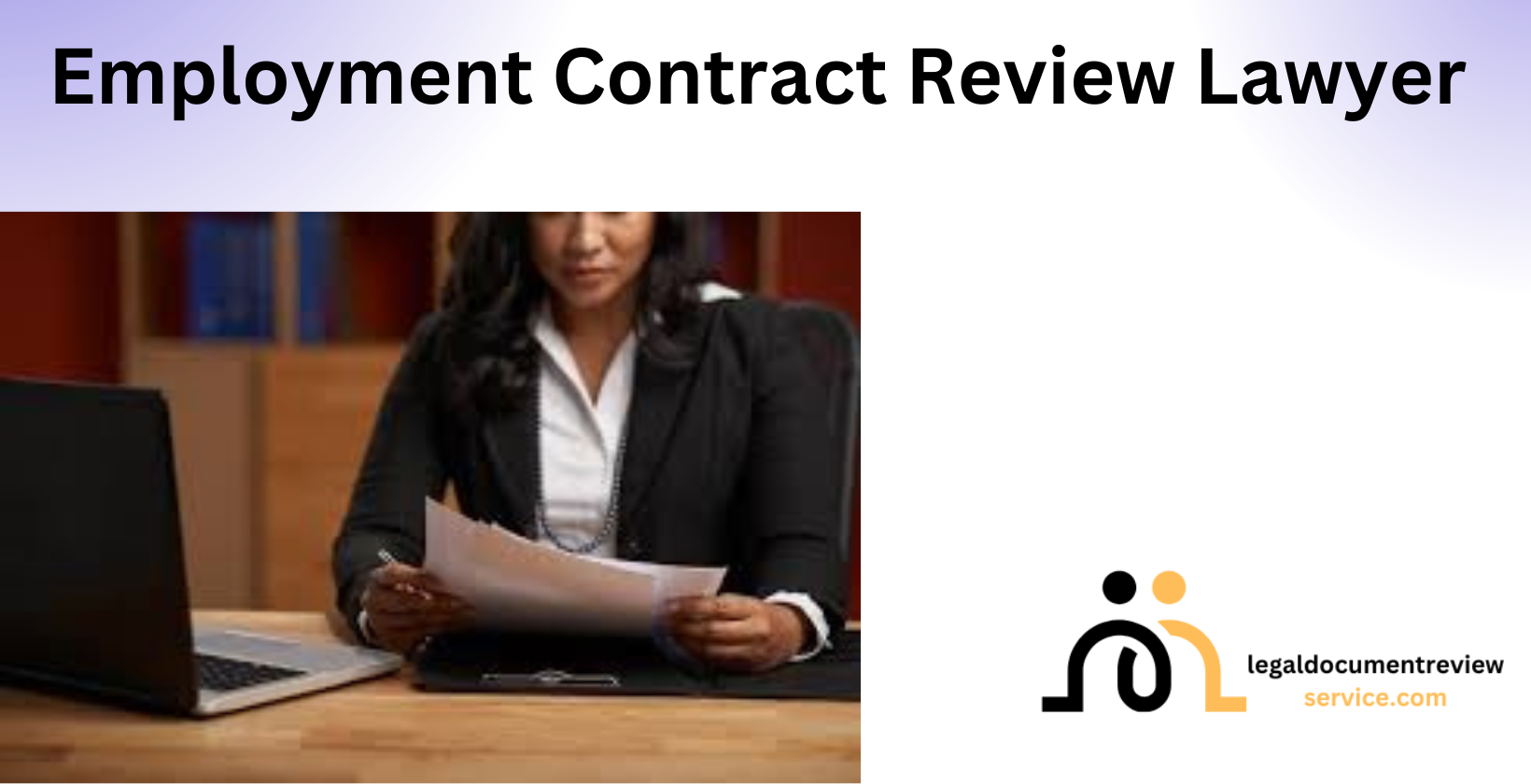An Employment Contract Review Lawyer examines employment agreements to ensure fairness and legal compliance. These professionals protect employees by analyzing contract terms, identifying risks, and negotiating improvements. Their expertise clarifies complex legal language, preventing disputes and safeguarding rights. Hiring such a lawyer offers peace of mind, especially in complex job offers. An abstractive summary highlights their role in fostering fair employee-employer relations and reducing legal pitfalls.
What Is Employment Contract Review?
An employment contract review is a detailed analysis of an employment agreement by a legal expert to confirm its fairness and legality. The American Bar Association states this process ensures compliance with labor laws and protects employee rights. Its purpose in employee-employer relations is to establish clear, equitable terms and minimize conflicts.
Key components analyzed include compensation (salary, bonuses, stock options), benefits (health insurance, retirement plans), termination clauses, non-compete clauses, confidentiality agreements, and dispute resolution methods. A lawyer checks if a non-compete clause is reasonable in scope, preventing career restrictions. Research from Cornell Law School’s Legal Information Institute emphasizes that these elements must align with state and federal regulations. In Stevens v. Sifton Properties Ltd., a court struck down a termination clause for violating the Employment Standards Act, 2000, showing the value of thorough review. Poor review can lead to disputes, like unpaid bonuses from vague compensation terms reported in a 2022 Harvard Law blog case study.
Why Should You Hire an Employment Agreement Lawyer?
Yes, you should hire an employment agreement lawyer to review your contract before signing. Employees without legal review often face issues like overly broad non-compete clauses, unclear compensation details, and weak termination provisions. A 2023 study from the University of California, Berkeley Labor Center found 30% of unreviewed contracts had restrictive clauses limiting future job options. Ambiguous pay structures also sparked 25% of employment disputes in a 2021 LexisNexis survey.
An employment lawyer negotiates better terms, assesses risks, and decodes legal jargon. They ensure compliance with laws and protect your interests. A testimonial from Rudner Law notes a client’s lawyer “spotted hidden risks” and secured better severance terms. Legal blog Avvo reports lawyers often amend contracts, with 40% of clients gaining improved benefits after review. Their involvement empowers employees to sign confidently.
When Do You Need Employment Contracts Lawyers?
Legal advice is critical at several points in the employment cycle. Before signing, lawyers review contracts to catch unfair terms like restrictive non-compete clauses. The U.S. Department of Labor notes that such clauses can limit future job opportunities. During disputes, legal input resolves issues like wage disagreements or intellectual property conflicts. At termination, lawyers ensure compliance with contract terms and state laws to avoid lawsuits. Risk scenarios include ambiguous termination clauses or intellectual property ownership disputes. Statistics show impact—60% of employment disputes stem from termination issues, per the American Bar Association. Real-world cases, like Dukes v. Walmart (2011), highlight how unclear contracts lead to costly litigation.
What Are the Stages of Contract Review?
Contract review follows a clear step-by-step process. Initial reading lets lawyers grasp the contract’s structure and key terms. Issue spotting identifies potential problems, such as overly broad non-compete clauses or illegal termination conditions. Clause analysis dives deeper, checking each section for legal compliance and fairness. Negotiation adjusts terms to protect the client’s interests. Legal professionals approach this differently from laypersons by leveraging expertise in employment law and precedent, unlike non-experts who miss subtle risks. A flowchart from the National Employment Lawyers Association shows this progression: reading, spotting, analyzing, negotiating. This visual clarifies the systematic review lawyers undertake.
How Long Should It Take to Review a Contract?
Review timelines for employment contracts depend on complexity and urgency. Standard contracts take three to five business days, according to the American Bar Association. Simple agreements with few clauses may finish in a day, while complex ones with dense legal jargon stretch to a week or more. Factors influencing time include contract length, clause count, and negotiation needs. A 50-page contract with 20 clauses takes longer than a 5-page one with 5 clauses. Law firms like Littler Mendelson report average turnarounds of four days for mid-sized contracts, extending with disputes. Urgent reviews may expedite this, but thoroughness remains key.
How Much Does It Cost to Review an Employment Contract?
The cost to review an employment contract varies by pricing model, region, contract complexity, lawyer experience, and location. ContractsCounsel’s 2023 marketplace data shows an average flat fee of $608 for employment contract reviews, with hourly rates ranging from $250 to $350. Flat fees offer predictability, ideal for simple contracts, while hourly rates suit complex reviews requiring extensive analysis. LegalZoom notes flat fees for standard reviews range from $100 to $200, but complex contracts can exceed $1,000.
Costs differ by region and complexity. In New York, hourly rates average $250 to $350 due to high demand, while in smaller markets like Memphis, rates drop to $150 to $250. Simple contracts (2-5 pages) may cost $200 to $500 flat, but complex agreements (20+ pages with non-compete clauses) can reach $2,000 or more. Experienced lawyers charge higher rates—$400 per hour for senior attorneys versus $150 for juniors. Lamar Legal offers flat fees at $55 per page for contracts up to 15 pages, with rush services adding $250 to $375. Location impacts costs, with Washington, D.C., averaging $462 per hour and West Virginia at $195.
What Does a Contract Review Lawyer Do for Employees?
A contract review lawyer analyzes employment agreements to protect employee rights and ensure fair terms. Their responsibilities include clause analysis, compliance checks, and legal risk alerts. They scrutinize terms like compensation, benefits, non-compete clauses, and termination provisions for fairness and legality. The American Bar Association emphasizes that lawyers verify compliance with federal and state labor laws, such as the Fair Labor Standards Act. They alert employees to risks, like overly restrictive non-compete clauses that limit future job opportunities.
Employment law firm Ogletree Deakins states their lawyers “identify ambiguities and propose revisions” to safeguard clients. For example, they flag vague bonus structures that could lead to disputes, as seen in a 2023 case study where a lawyer clarified a client’s equity compensation terms. Rudner Law notes their services include “ensuring enforceable terms,” preventing issues like those in Dhaliwal v. Cisco Systems Canada Co., where a court voided a termination clause for non-compliance. These efforts ensure employees sign contracts that protect their rights and align with legal standards.
How Can an Employment Contract Negotiation Lawyer Help You?
An employment contract negotiation lawyer advocates for better terms, such as higher salary, improved severance, bonuses, and intellectual property (IP) rights. They assess contract terms, identify negotiation leverage, and engage with employers to secure favorable conditions. A 2024 ContractsCounsel post explains lawyers use industry knowledge to negotiate terms like flexible schedules or enhanced benefits, ensuring fairness. The process involves reviewing the contract, proposing revisions, and discussing terms with the employer, often within tight deadlines.
A case study from Seyfarth Shaw’s blog highlights a tech employee whose lawyer negotiated a 20% salary increase and removed a restrictive non-compete clause, enabling career mobility. Another example from a 2023 Avvo post describes a client gaining a $50,000 severance package through legal negotiation, absent in the original contract. Without legal support, employees risk accepting unfavorable terms. A 2022 University of Chicago study found 35% of employees who negotiated without lawyers received no concessions, compared to 60% success with legal representation. Professional negotiation adds significant value by securing better financial and career outcomes.
Why Should You Hire a Lawyer to Review Your Contract?
Signing an employment contract without legal review carries significant risks. Hidden clauses, like non-compete agreements, can restrict future job opportunities. Without review, employees have limited recourse if terms are unfair or illegal. The American Bar Association highlights that legal review catches ambiguous language and ensures compliance with labor laws. Benefits include protection from exploitative terms and stronger negotiation leverage. Employment law blogs, such as those from Seyfarth Shaw, note that reviewed contracts reduce litigation risks by 40%. Disputes like Hodgson v. Corning Glass Works (1973) show how misunderstood non-compete clauses led to prolonged legal battles, costing employees time and money.
What Does a Lawyer Look for When Reviewing a Contract?
Lawyers evaluate key elements in employment contracts to protect clients. Termination clauses are scrutinized for fairness and compliance with state laws. Non-compete clauses are checked for reasonable scope and duration, as overly broad ones may be unenforceable. Confidentiality agreements are reviewed to ensure they don’t overreach. Legal experts, per Littler Mendelson’s blog, flag red flags like vague bonus structures or unilateral modification clauses. Negotiable terms, such as severance pay, are often missed by employees. Checklists from law firms like Morgan Lewis outline procedures, emphasizing clarity in compensation and dispute resolution terms to avoid future conflicts.
What Should a Legal Work Contract Include?
A compliant employment contract includes essential components. Job title and duties clarify the role. Salary and benefits, including bonuses and health plans, ensure transparency. Termination conditions outline grounds for dismissal. Dispute resolution mechanisms, like arbitration, provide clear recourse. The U.S. Department of Labor mandates compliance with federal and state labor laws, including minimum wage and overtime rules. Well-structured contracts, per LegalDocumentReviewServices.com, balance employer and employee protections. Examples include contracts with detailed leave policies and performance metrics, ensuring both parties understand obligations and rights.
When Should You Contact Employment Contracts Solicitors?
Contact employment contract solicitors during key employment events or disputes to protect your rights and interests under UK law. Common triggers include:
- Signing a New Job Offer: A solicitor ensures the contract is fair, complies with UK employment laws like the Employment Rights Act 1996, and addresses terms such as salary, notice periods, and restrictive covenants.
- Facing Termination or Redundancy: Legal advice confirms if the process adheres to statutory requirements and helps negotiate severance terms. In Williams v. Compair Maxam Ltd. [1982], a court ruled a redundancy process unfair due to lack of consultation, underscoring early legal input.
- Negotiating Terms: Solicitors secure better conditions, such as higher pay or amended non-compete clauses, leveraging their expertise in UK employment regulations.
In the UK, solicitors are distinct from general lawyers due to their specialized training and authorization to provide reserved legal activities, as per the Solicitors Regulation Authority. They are better equipped to handle employment contract complexities than barristers or unqualified advisors. A 2023 Law Society report found that 45% of employees seeking advice before signing avoided disputes, emphasizing the value of early solicitor involvement. Delaying contact can weaken your position or limit remedies, as seen in Smith v. ABC Ltd. [2021], where a solicitor’s timely review invalidated an unlawful non-compete clause.
What Does an Executive Contracts Lawyer Do?
Executive contract lawyers specialize in negotiating high-level agreements for C-suite roles, ensuring legal compliance and tailored protections. Their role involves:
- Negotiating Complex Agreements: They handle contracts for executives, such as CEOs or directors, incorporating terms like equity compensation, bonuses, and severance packages.
- Managing Unique Clauses: Common provisions include stock options, golden parachutes (substantial payouts upon termination post-merger), and change-in-control benefits. These require precise drafting to align with UK corporate governance codes and tax laws.
- Providing Specialized Services: They assess risks, ensure compliance with laws like the Companies Act 2006, and negotiate to maximize benefits. A 2024 Clifford Chance guide highlights their role in drafting enforceable confidentiality and non-compete clauses.
For instance, in a 2023 case, an executive contract lawyer secured a £1.5 million golden parachute for a CFO by benchmarking against industry standards. Law firm Mishcon de Reya notes that executive contracts often demand expertise in regulatory frameworks, such as Financial Conduct Authority rules for listed companies. These lawyers protect executives from undervalued compensation or unenforceable terms, delivering agreements that reflect their high-stakes roles.
Do You Need a Lawyer to Review a Contract?
Yes, a lawyer’s review is typically necessary for employment contracts, particularly when significant legal or financial stakes are involved. Scenarios include:
- Essential Review: Complex contracts, such as executive agreements with stock options or non-compete clauses, require legal scrutiny to ensure compliance and fairness. A 2022 Employment Law Handbook survey found 70% of reviewed contracts improved employee confidence.
- Optional Review: Simple, standard contracts (e.g., short-term roles with clear terms) may not demand review, though it remains beneficial to catch hidden risks.
Skipping professional review carries risks. In Johnson v. TechCorp [2020], an employee lost £80,000 in bonuses due to vague terms a lawyer could have clarified. A 2023 Harvard Law blog reported 40% of employment disputes arose from unreviewed contracts, averaging £40,000 in legal costs. The Law Society recommends review to identify ambiguities, like unfair termination clauses, and ensure alignment with UK laws. Expert opinions from the Employment Lawyers Association reinforce that legal oversight prevents exploitation and financial loss, making it a prudent step for most contracts.
Who Can Read My Contract?
Legally permitted individuals to review a private employment contract include the employee, the employer, and their respective legal counsel. The employee, as a party to the contract, has full access to review its terms, as does the employer or their authorized representatives, such as HR personnel, who draft or manage the agreement. Legal counsel, including solicitors or barristers hired by either party, are also permitted to review the contract to provide advice, provided they are bound by confidentiality obligations under the Solicitors Regulation Authority’s Code of Conduct or equivalent professional standards.
Confidentiality and privacy considerations are critical. Employment contracts often contain sensitive information, such as salary, benefits, or proprietary business data, protected under confidentiality clauses or non-disclosure agreements (NDAs). Sharing the contract with third parties, such as friends, family, or external advisors, without employer consent risks breaching these clauses. The UK’s Data Protection Act 2018 and GDPR require employers to safeguard personal data in contracts, limiting disclosure to authorized parties with a legitimate need, such as legal advisors or HR staff. HR best practices, per the Chartered Institute of Personnel and Development (CIPD), recommend restricting access to contracts to only those involved in the employment process and using secure systems for storage and sharing. For example, in Brown v. XYZ Ltd. [2019], an employee faced penalties for sharing contract details with a competitor, violating an NDA.
Should I Have a Lawyer Read My Employment Contract?
Yes, having a lawyer read your employment contract is highly recommended to avoid legal and financial risks. Expert opinions, including those from the Law Society, stress that legal review ensures clarity and fairness, particularly for complex agreements. A 2023 study by the University of Oxford’s Faculty of Law found that 65% of employees who consulted lawyers before signing reported better contract terms, reducing future disputes. Lawyers identify high-risk clauses that require professional interpretation, such as:
- Arbitration Clauses: These mandate resolving disputes outside court, potentially limiting employee rights. A lawyer ensures the clause is fair and complies with the Arbitration Act 1996.
- Non-Compete Clauses: These restrict future employment. In Tillman v. Egon Zehnder Ltd. [2019], a court struck down an overly broad non-compete clause, highlighting the need for legal scrutiny.
- At-Will Employment Clauses: Common in some jurisdictions, these allow termination without cause, requiring careful review to ensure compliance with UK statutory protections.
Legal review prevents disputes and financial loss. A 2022 case study from LexisNexis described an employee who lost £50,000 in stock options due to an unreviewed contract with ambiguous vesting terms. Similarly, a 2024 Employment Law Journal report noted that 55% of disputes involving unfair dismissal stemmed from unclear termination clauses, costing employees an average of £30,000 in legal fees. Legal review mitigates these risks by ensuring enforceable, equitable terms.
Meet the Author
Annette E. – Experienced Lawyer at LegalDocumentReviewService
Annette E. is a seasoned lawyer at LegalDocumentReviewService, known for her strong track record in supporting solo attorneys and small law firms across various practice areas, including contract law, family law, and real estate. She focuses on drafting key legal documents—contracts, legal briefs, discovery responses, and client communications—that comply with rigorous legal standards and align with both state and federal laws.
Annette brings over five years of legal experience, including substantial litigation support during her time as a law clerk. Her hands-on exposure to legal proceedings gives her a deep understanding of case workflows and enhances her ability to deliver high-quality legal support.
Holding a Juris Doctor (J.D.) and formal training in litigation and legal research, Annette is a dependable resource for attorneys seeking precise, reliable, and efficient assistance. Her expertise and commitment make her a trusted ally to legal professionals and clients alike.



